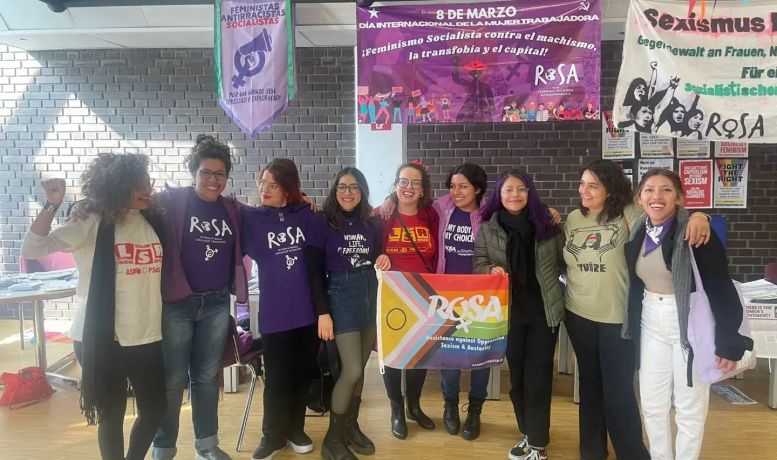Elin Gauffin is a member of ISA’s International Women’s Bureau.
“Our Resistance is Not Made of Sand”
There is hope in the youthful socialist feminism around the world, which, in conjunction with the workers’ struggle, is sowing the seeds of a new society.
The first international ROSA conference Women Life Freedom took place on 18 and 19 March, 2023. 200 participants from 19 countries had gathered in the meeting room in Vienna and zoomed in from another 11 countries. More experienced activists alongside newer ones, inspired by the revolutionary feminist workers’ struggle in Iran, were determined to stand up to the right-wing backlash and take the fight forward.
Parisima Khoram was one of the speakers with an Iranian connection. She talked about her fear of the infamous Evin prison in Tehran and the chilling news about the fate of Sepideh Gholian. Sepideh was released this week after four years and seven months behind bars. When she came out, she was dragged along by the chorus of protesting youth and started shouting slogans. But then, after only four hours of freedom, she was kidnapped by security forces and locked up again. Parisima also argued against the royalists who are trying to hijack the Iranian revolution to reinstate the capitalist dictatorship that Iran had before 1979.
ROSA in Vienna has played an important role in organizing support for the Iranian struggle. Yasmin Morag talked about this, how they organized support demonstrations of 1000 participants during the autumn and sent broad-based statements of support that they know have been disseminated in Iran with arguments for a workers’ focus on the continued struggle.
Spurning all “conscious saboteurs of the revolution”
Anja Deschoemacker from the ISA Women’s Bureau (International Socialist Alternative) was one of the speakers who drew on the history of socialist feminist struggle. In 1907, on Clara Zetkin’s initiative, the first international socialist women’s conference met with delegates from 19 countries. They launched International Women’s Day, which was first celebrated in 1911. Anja used a famous quote from Zetkin — “As for those comrades who do not gather and train women to become conscious partners in the revolution, I call them conscious saboteurs of the revolution,” which is still relevant today.
Ten Years of ROSA in Ireland — ten years of struggle and a major abortion victory
Another milestone, noted by Laura Fitzgerald, was the 10th anniversary of ROSA in Ireland, the first ROSA group to be formed. ROSA was a vital force in the movements that led to the legalization of abortion in Ireland in 2018. Ruth Coppinger, former Socialist Party member of parliament and leading socialist feminist in the abortion rights struggle in Ireland detailed the extraordinary lengths that ROSA went to, including campaigns of civil disobedience with the abortion pills, to help secure this victory. Today, ROSA in Ireland brings together regular activities and campaigns against racism and men’s violence against women, among other things. A total of 41 people had traveled to the conference in Vienna. Laura expressed her joy that the movement has come so far and is now at an international level. “I’ve never seen anything like it — so vibrant and youthful and replete with determination to strike forward with our international socialist feminist struggle”, Laura commented afterwards. The party on Saturday night was just that, with wonderful singing, poetry and dancing from many different talents.
Latin American delegation at the heart of the discussions
One of the newest ROSA groups to participate was ROSA Mexico. Every year, millions take to the streets on March 8, and this year was no exception. This time ROSA Mexico was founded on this day, still a small group but growing and with a very important program. Maite Olivares spoke in Vienna about the abortion struggle, which has achieved partial victories but has been paused. After the Supreme Court decriminalized abortion in 2021, only two states have adjusted their laws and free abortion is only available in 11 out of 32 states. The leftist party Morena and President Andrés Obrador are constantly failing the women’s struggle, so parliamentary victories cannot be relied upon. The pressure of the masses from below must continue. Maite emphasized that since we live in a system that sees our bodies as factories to produce future labour, a system that fosters gender inequality and gender roles, a system where the traditional family is at the core of society — the whole system has to change.
Nowhere is that clearer than in Brazil. The genocidal policies of the Bolsonaro government have been utterly catastrophic for women. Maria Clara of Feministas Anti-Racistas Socialistas spoke of how Brazil was now back on the Hunger Map, and how during the pandemic, apocalyptic scenes of women queuing outside butchers for leftover bones were a stark reminder of who was bearing the brunt of the social crisis. On top of poverty and hunger, the far-right’s whipping up of racism and misogyny has created a hostile environment for indigenous and black women, who face brutal violence in the home, on the streets and at the hands of the state. And, as Yasmím pointed out, trans people who have a life expectancy of 35 in Brazil, are locked in a daily struggle for mere survival. While Bolsonaro may no longer be in office, the threat of the far right still remains. Sadly Lula’s policies, which pose no challenge to the rule of big business and imperialism, cannot tackle the root of the overlapping crises facing women. That is precisely why Feministas Anti-Racistas Socialistas was recently launched — conscious of the need to build a combative working-class feminist movement with an anti-capitalist and socialist programme.
Legacy of colonialism and imperialism
Phemelo Motseokae from the Socialist and Workers Party in South Africa gave a thorough presentation on how capitalism creates patriarchy in the neo-colonial world, starting with pre-colonial societies in Africa. The former gathering and hunting societies were relatively equal. Gender oppression became established with the rise of class society. In what is now Botswana, for example, a class society was formed based on cattle ownership where women were often treated as children and as the property of men. Colonialism then reinforced these structures. “The idea that feminism is a product of the West is completely undermined when black women joined the struggle against the specific oppression they face,” said Phemelo, giving many examples from history.
Attacks on bodily autonomy in the US
The major setback of the Supreme Court’s abolition of the precedent that gave abortion rights in the US — Roe vs Wade — was an obvious theme when Keely Mullen of Socialist Alternative took the stage. Socialist Alternative (ISA in the US) went to great lengths to try to stop the attack, organizing school strikes, including a 20 000-strong march in New York. After the defeat, socialist Kshama Sawant in the Seattle City Council, together with the struggle from below, ensured that the city became the first in the country to provide legal protection to women and health care workers fleeing other states over the abortion issue and that abortion care is subsidized by the city budget.
The counter-revolution continues and 426 bills against LGBTQIA rights are underway. A great responsibility lies with the Democratic Party, which for decades has won votes on the promise that the counter-revolution against women and LGBTQIA people will not be allowed, but now it is happening without them stopping it. Socialist Alternative is committed to strengthening struggle, and are consistently pushing the urgent need for a mass socialist political force of and for working class and oppressed people – — a new and independent working class party that is imbued with socialist feminism and anti-racism.
Connecting feminist and workers’ struggles
Another important ROSA group is the one in Belgium. Mai Vermeulen shared the shocking news that sexist Jeff Hoeyberghs, who because of ROSA’s campaign became the first person to be sentenced to prison for a misogynistic speech at the University of Ghent, had his sentence reduced by a higher court and has now escaped imprisonment. This is part of the counter-revolution against feminism that has taken too many forms in recent years, including the hateful online campaign against actress Amber Heard who experienced domestic violence at the hands of megastar Johnny Depp.
ROSA Belgium was highly praised by trade union leader Angeline Van den Rijsse from East Flanders. She organizes 35,000 workers in the socialist union (equivalent to LO-affiliated metalworkers and others). Together they have fought for and won a €14 minimum wage for employees such as cleaners and canteen staff at Ghent University after a successful strike.
It is possible for all workers in Belgium to go on strike on International Women’s Day without facing repression. Angeline told me that it’s not every year that trade unions are able to campaign on the issue and lead to strikes. But a positive example was on March 8 three years ago when 1,000 home care workers went on strike. Angeline called for more action from the ETUC in her speech. The President seems to be sleeping, we need to wake him up.
Care workers in struggle
In Germany, both ROSA and the broader women’s and workers’ struggle are growing. On March 8, pre-school strikes shut down large parts of the country. Linda Fischer from ROSA Germany was invited to speak at a strike meeting with 2000 workers in Hamburg and there the union Verdi also suggested to ROSA that they should have a joint block in the March 8 demonstration.
The ROSA conference also dealt with the brutality of war and affirmed its anti-war and anti-imperialist stance, focusing most deeply on the situation in Ukraine and the Israeli occupation of Palestine, as well as the far-right threat in Latin America.
Despite the difficult and complicated situation in the world, the ROSA conference was very inspiring. There is hope in the youthful socialist feminism around the world, which, in conjunction with the workers’ struggle, is sowing the seeds of a new society. With a socialist system based on common ownership and governance, we can win a world without exploitation and oppression. One of the stops along the way will be Nurses’ Day on 12 May, when ROSA and ISA in different countries will organize various forms of protest.
The task is great, but through internationalism we will be stronger. Laura Fitzgerald quoted one of the slogans of the March 8 demonstration in Istanbul which, after the earthquake disaster, is gathering new strength and on International Women’s Day managed to resist Erdogan’s riot police: “Our resistance is not made of sand – — it will not collapse like your buildings”.
Voices from the ROSA conference
Irene Mötzl, Vienna, Austria
You organized a walk-out on 8 March, tell us!
“We gathered employees from five different companies in a workers’ meeting. It was planned only three weeks in advance. The purpose of the network was to anchor March 8 as a day of struggle. It was also about politicizing the workers.”
Moumita Santra, India
“It has been very important to be here. I thought we were isolated in our struggle. The media does a very bad job of portraying Western feminism as only fighting for rich women. But now that I come here, I see that it’s very similar to what women are fighting for in Europe and the US, our issues are very similar.
One struggle I have been active in is at Banaras Hindu University in Varanasi in 2016. Female students were given a curfew from 18:30, while male students have no restrictions. The lockdown meant that we could not use the library, which was only open in the evening. The fight resulted in a partial victory and we are now allowed to go out until 22:00.
There is still a lot of sexual harassment against female students and gender violence is widespread, which is still causing major protests even though it is not nationwide as it was in 2013.”
Júlia Bakó, Júlia Racz, Júlia Bucse and Janka Balint, Hungary
“We organize discussion clubs and workshops. Right now we have a workshop for teachers to support them in their struggle. There is a prolonged teachers’ strike for higher wages in Hungary.
It is quite difficult to organize because there are constant attacks on feminism and there is a widespread negative image of feminism. Because of the former Stalinist system, it is also difficult to call yourself a socialist. We decided a year ago to take a socialist approach and we call ourselves outwardly left-wing.
Internationalism is strengthening for us. We have previously been to an international Kurdish conference and now we are meeting ROSA for the first time. The ROSA conference has given us more examples of how to organize ourselves.”



